African Tattoos: Tattooing Tradition, Designs, and Meanings
[ad_1]
Known as the ‘cradle of humankind’, the African continent has kept the world fascinated for hundreds of years. The wildlife, the tradition, the interesting and unique approach to life and the neverending bond with nature and animals is what makes the continent so unique and so close to our origins and what we are as humans.
Unfortunately, the African continent is also the one constantly facing poverty and exploitation, which has been a huge setback for almost every African country for decades. It is truly bothering that so many people are fascinated by African countries and their cultures, but do so little to help them out and ensure they continue blooming.
But, we’re not here today to talk about these unfortunate topics. We’re here to celebrate the fact that Africa is the origin of tattoos. To do that, we’re going to explore everything we know about African tattoos, the tattoo traditions, the meanings of the designs, and much more. This is our way of showing appreciation to this ancestral form of body art, and hopefully, inspire some of you out there to continue this exploration on your own. So, without further ado, let’s get started!
The Origin Of African Tattoos
The First African Tattoo
It is believed that the oldest evidence of purposeful and symbolic tattooing in humans originates in ancient Egypt. Upon the discovery of several tattooed mummies, scientists have established that 5000 years ago, African people have utilized body art and tattoos to either express their social status or adorn their bodies.
It is also believed that tattoos were considered a cure for illnesses or as a form of protection against evil spirits. Tattoos were also used to showcase one’s belonging to a certain tribe and one’s loyalty to that community.
Because the discovered mummies of Deir el-Medina were believed to be female, scientists have also concluded that these tattooed women were key religious practitioners in their communities. Their tattoos were also those of healing and protection.
The Spread of Tattooing in Historic Africa
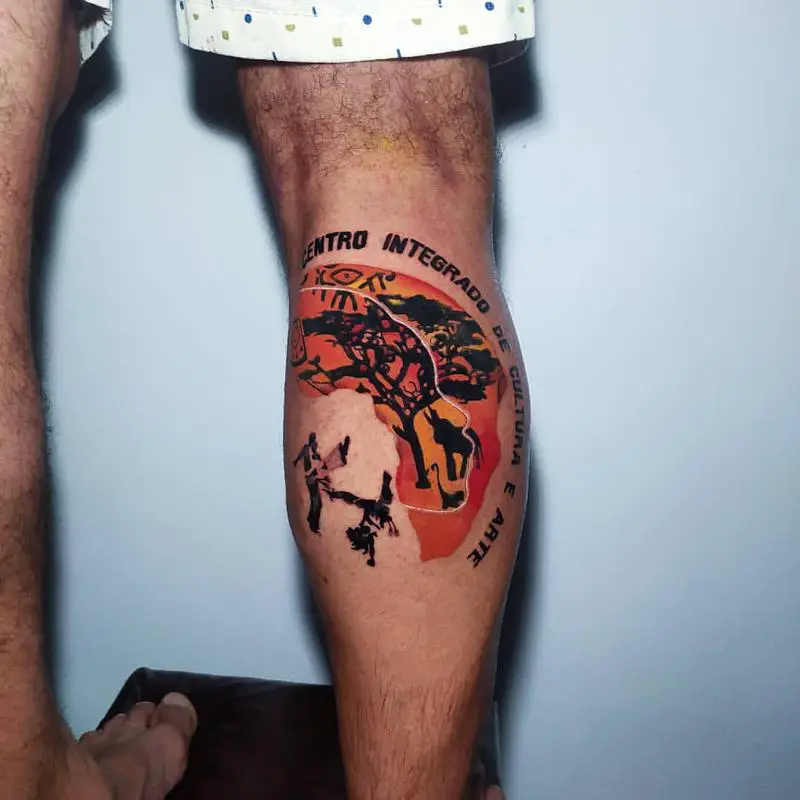
It is well known that Northern African people were the ones more embracing tattooing as a part of their religious and ritual practices than the Southern Africans, or the sub-Saharan people and regions. The Nothern tribes and, what we know nowadays as individual countries, used tattoos to show their identity, their belonging to a specific tribe or community, or self-expression.
Interestingly, upper-class African women were to ones who also spread the tattooing practice across ancient Egypt and Northern Africa. This is because it was believed that tattoos, or permanent body markings, symbolized the woman’s fertility, status, and worship.
With the arrival of monotheistic religions, specifically Islam, to the Northern African countries, the practice of tattooing among African people diminished. This is because in Islam, tattooing is considered to be a sin and a form of self-mutilation. As a God-given being, it is believed that by getting tattooed, you’re ruining something God created. Therefore, the practice of tattoos was abolished.
However, the tradition of tattooing remains among non-Islamic tribes, who have spread it across future generations. Nowadays, traditional African tattooing is present and serves as an inspiration for people around the world.
The Spread of Scarification in Sub-Saharan Historic Africa
As we mentioned, tattooing in Africa started as an ancient Egyptian practice, that spread quickly among Northern Africa. However, people of Central and Southern Africa had a different practice of self-expression; scarification.
Instead of using the ancient form of ink, these people would carve symbols and patterns into the skin, thereby forming permanent scars. Just like tattoos, these scars were believed to be a form of protection from evil spirits or a cure for illness.
Scarification was generally spread among ancient African women, especially younger girls. The scars were believed to be a sign of beauty, but also a sign of womanhood (symbolizing puberty, fertility, menstrual cycle, and childbirth).
Nowadays, scarification is a popular practice in African countries. It is believed to be a practice of strength and courage or is used to mark a significant moment in one’s life.
African Tattoos – Designs and Meanings
To fully understand the origin and tradition of African tattoos, we have to take a look at some popular symbols used in African tattoo designs.
Adinkra Tattoo Symbols
Adinkra tattoo symbols are believed to be a creation of Gyaaman tribes who used to live in West Africa, or the present-day Côte d’Ivoire region. These tattoo symbols were only used by the key religious and spiritual leaders, as well as people who belonged to the royalty. The Adinkra tattoo symbols are numerous, and each has a specific meaning. Here are some of them;
- Dwennimmen Adinkra Symbol – symbolizing strength and humility, the Dwennimmen symbol is based on the design of two rams crossing or butting horns against each other. The image is designed to have the bird’s eye view, from above. This symbol usually referred to the need to stay humble and close to the ground even when in possession of great power or status.
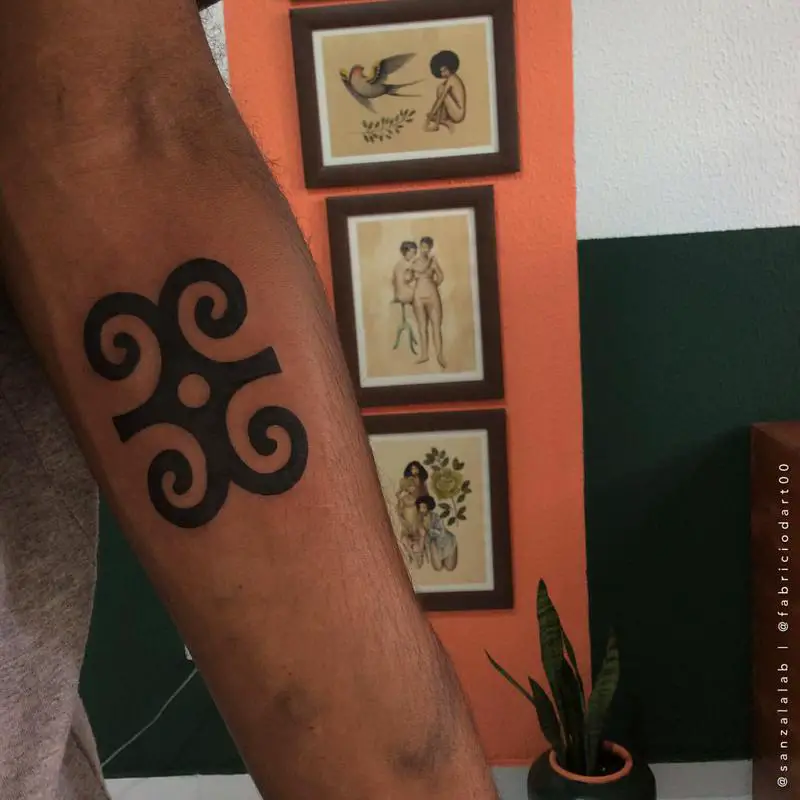
- Sankofa Adinkra Symbol – originating in West Africa as well, the Sankofa symbol represents a bird with an egg in her mouth, turning backward. It symbolizes one’s need to understand the mistakes and lessons learned in the past, and the need to use them in the present day. This is powerful symbolism that can serve as a life-long reminder of one’s positive progress and constant improvement.
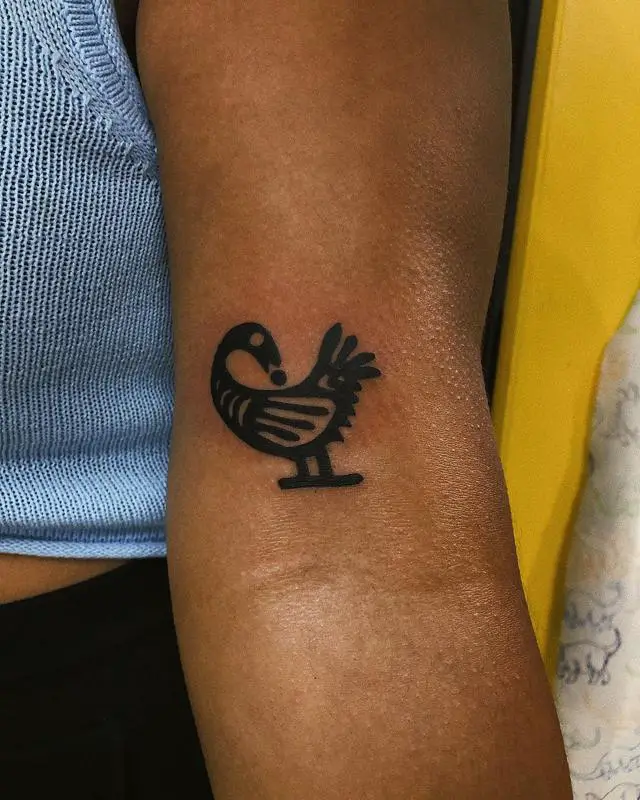
- Duafe Andikra Symbol – Duafe is a ‘wooden comb’ and the tattoo symbolizes womanhood, beauty, and femininity. This tattoo design is unique to the Ashanti tribes of Africa and is popular among African women abroad since it serves as a reminder of their African roots.

African Tribal Tattoos
African tribal tattoos are some of the most famous tattoos in the world. With unique designs and symbols of hardships, courage, landscape, and wildlife, these tattoos are often large and intense in design/outline. Each African tribe has their own tattooing practices and symbols. Here are some of the most popular and meaningful African tribal tattoo symbols;
- Ankh Cross – this is an African and ancient Egyptian symbol of eternity. It is one of the symbols used by Pharaohs, as it was believed they would need the Ankh cross for the afterlife.
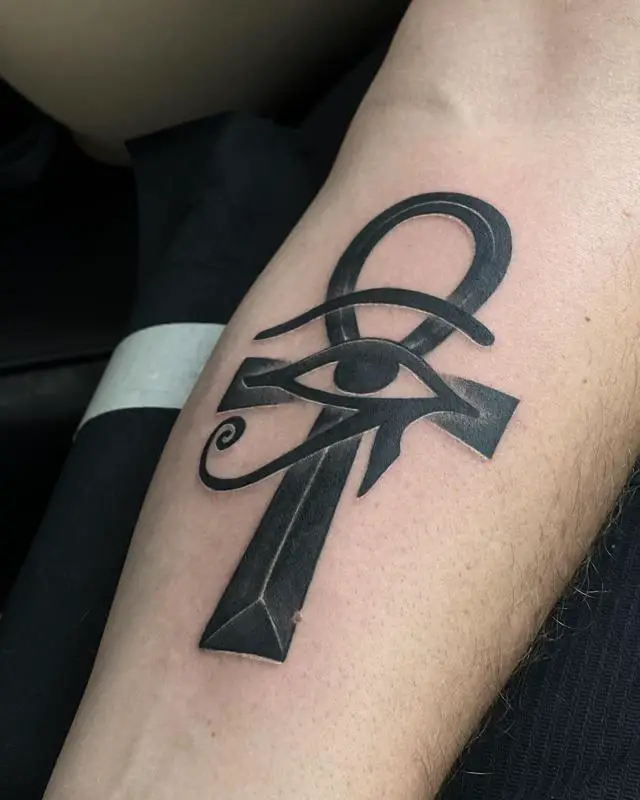
- Akoben Vuvuzela (The Horn’s siren) – this design symbolizes a specific horn used to summon people for urgent meetings. It symbolizes foresight and being able to recognize what comes next. It shows that you’re always ready for what life brings.

- Twiga (Giraffe) – one of the most recognizable African animals in the world is the giraffe. This tattoo is used as a reminder to act like a giraffe through life; be peaceful and assured, not too proud or aggressive. But, when you’re confronted, one should not be afraid to attack back (in the form of a violent swing, like a giraffe would attack). It also symbolizes one’s need to keep the head high, above the crowd.
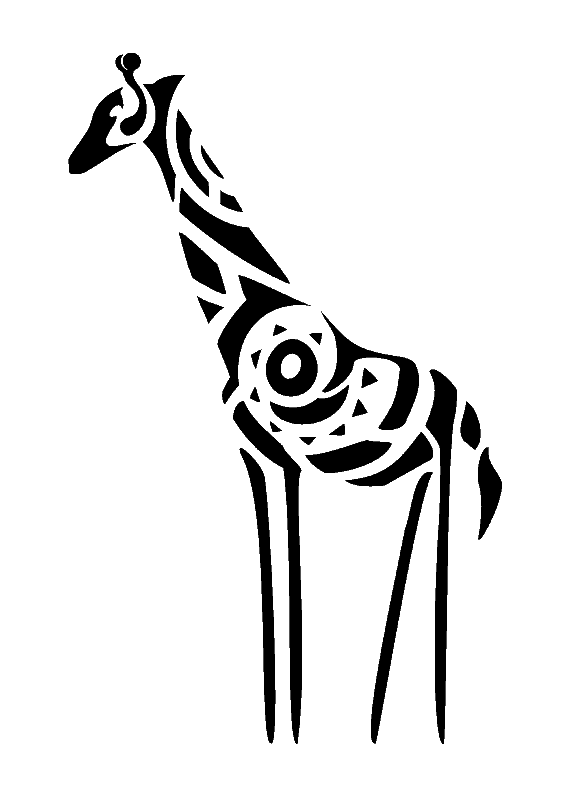
- Funtu (Siamese Crocodiles) – this tattoo symbolizes Siamese crocodiles. The meaning behind the tattoos is that of unity despite facing different directions or wanting different things. The tattoo emphasized the importance of individual identity, and how it should not be sacrificed, as well as how one should respect the other’s identity too.
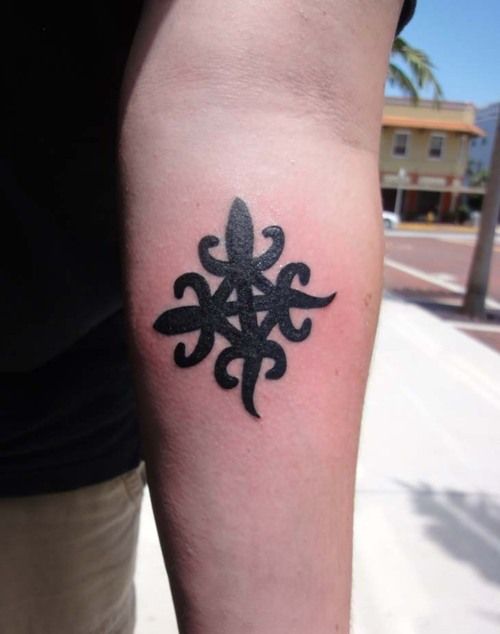
- Ngwena (Menacing Crocodile) – this tattoo symbolizes the ‘menacing crocodile’. This is not a particularly positive tattoo since it carries the meaning of being power-grabbing, manipulating, and mischievous. That is because in Africa, people refer to politicians as Ngwena, to emphasize their fakeness or their ‘crocodile tears’.

- Aya (Fern) – a fern plant carries a lot of meaning and symbolization in African culture. It usually symbolizes resourcefulness, endurance, and the ability to go against the odds and challenges, since the plant has to grow in such conditions. Therefore, the Aya tattoo stands for understanding oneself, one’s abilities, and purpose.

African Warrior Tattoos
African warrior tattoos are usually tattoos done by different tribes and people across the continent to express to show off love for the tribe, one’s faith, and belief, belonging to a community, leadership, etc. Let’s look at some popular African warrior tattoos and the meaning behind each of the designs;
- Shaka Zulu Emblem Tattoo – Shaka is the traditional leader of the Zulu tribe. Known for their rich culture, warrior history, and the Assegai Zulu spear, the Shaka Zulu tattoo si the perfect embodiment of the African warrior symbolism.
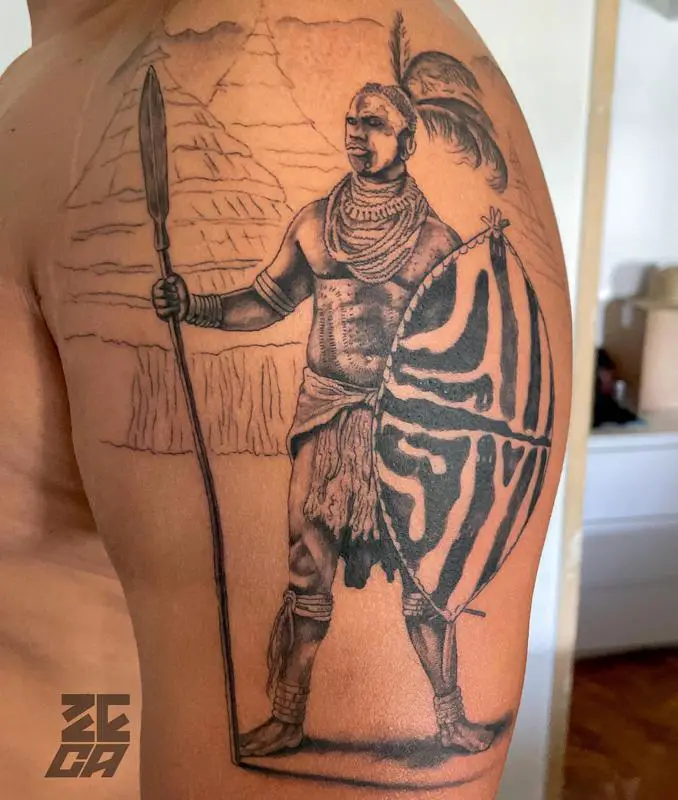
- African Goddess Oya Tattoo – African warriors believed in numerous gods and goddesses to give them the power to fight and win. Oya is an African goddess known for her protectiveness and ferocious nature, worshipped by the Yoruba tribe in Nigeria. Oya is a powerful goddess with the ability to creates hurricanes and thunderstorms.

Other African Tattoo Designs
African Elephant Tattoo
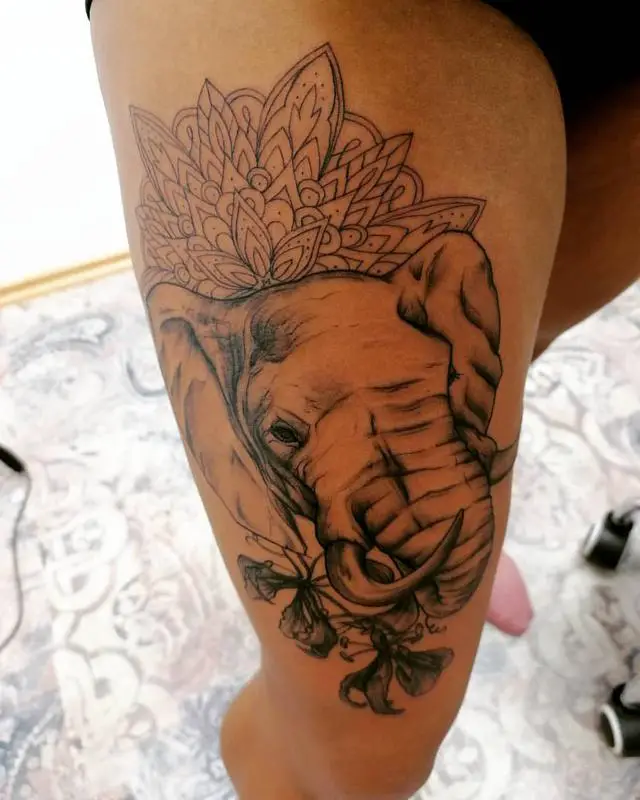
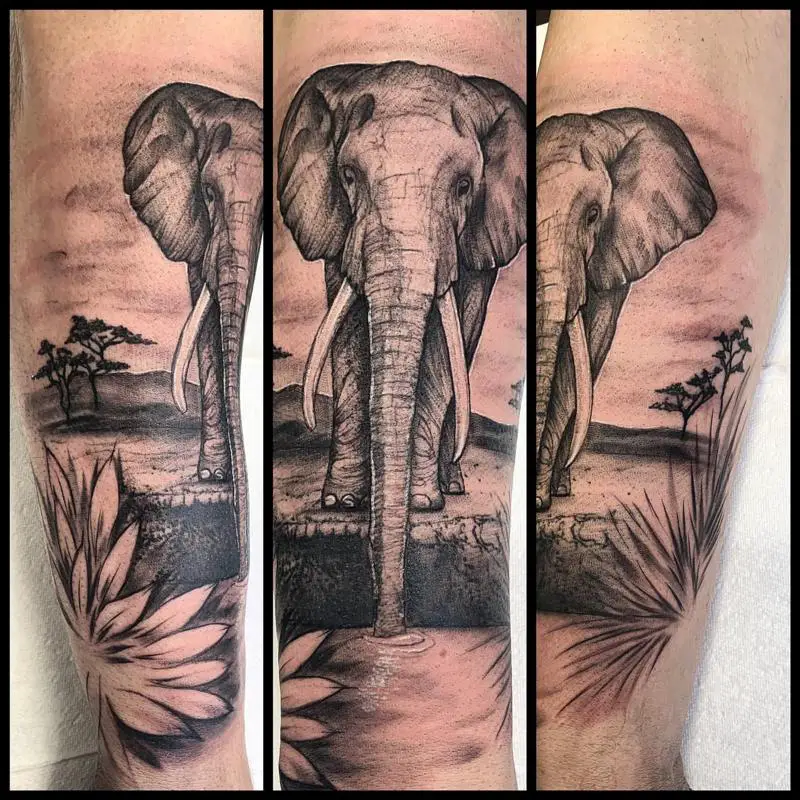
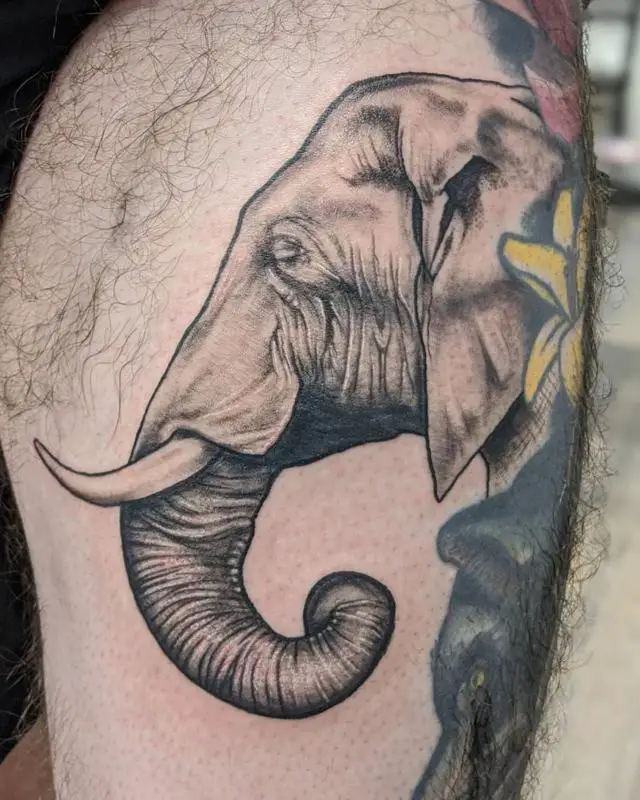
Elephants are some of the most important and most recognizable animals on the African continent. For African people, the elephant carries a strong spiritual meaning, as is viewed as the source of wisdom, according to African mythology.
The elephant is also viewed as a powerful animal, and as such serves as an inspiration and a source of great respect among African people. That is why elephant tattoos are so popular; they look spectacular and have a deep meaning which comes from the very African roots.
African Lion/Lioness Tattoo
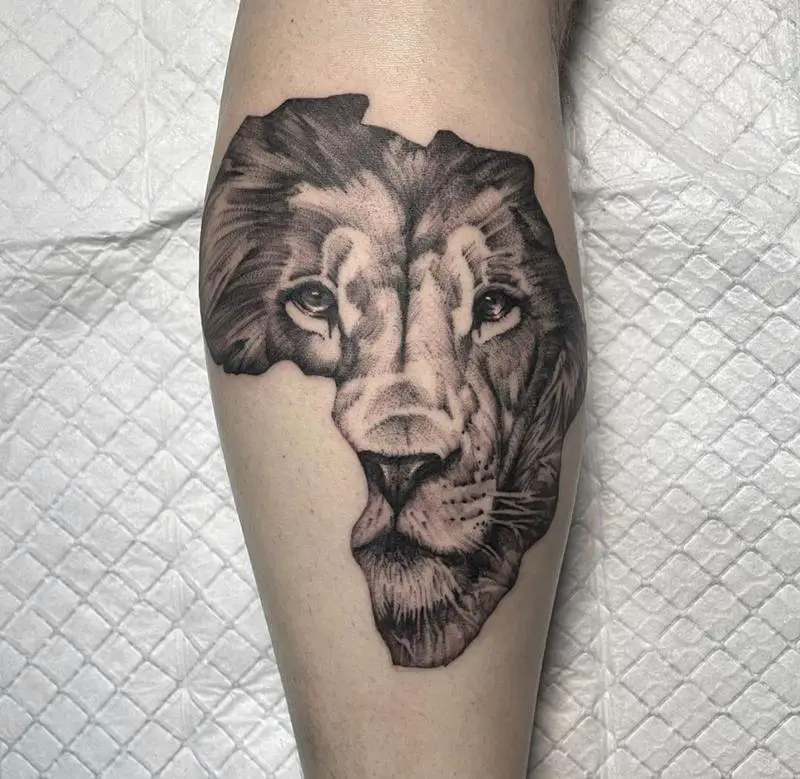
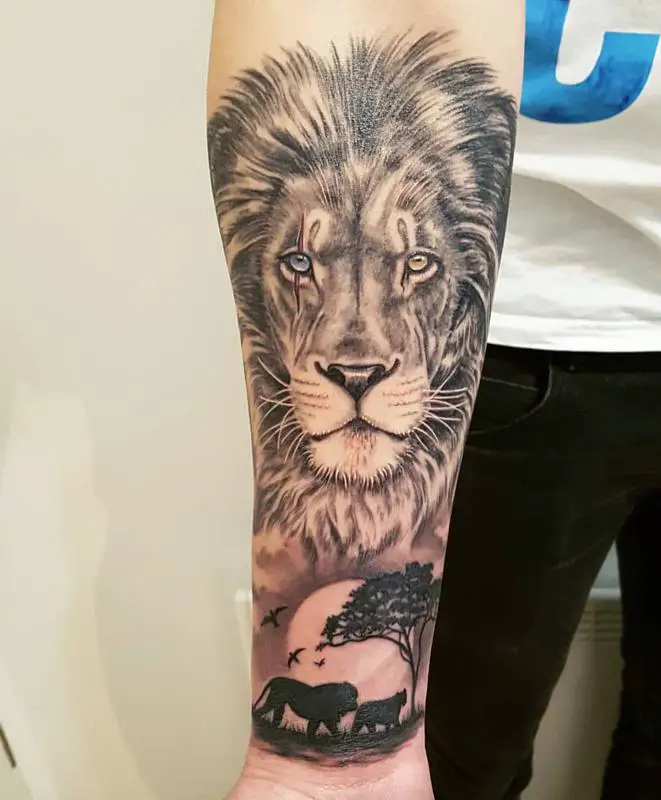
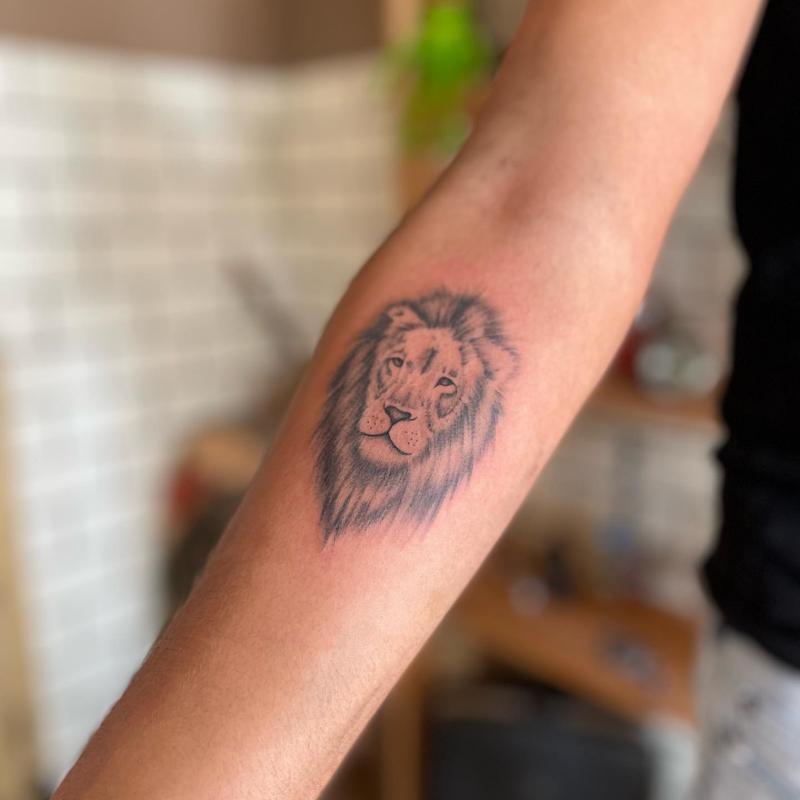
The king of the jungle and the kind of Africa; the lion is one of the most prominent African animals thanks to its role in the animal kingdom and the meaning its existence carries in African history.
African people see lions as a source of power, courage, protection, and wisdom. That is why the African lion is the perfect tattoo to honor this incredible animal. African lioness is also seen as a symbolic animal, source of feminine power and motherhood.
Read More:
- 40 Powerful Lion With Crown Tattoo 2021 (Meanings And Design Ideas)
- 30+ Fearless Lion Tattoo On Hand: Brave Designs To Try This Season
- 23 Lion Tattoo Design Ideas (Meaning and Inspirations)
African Mask Tattoo
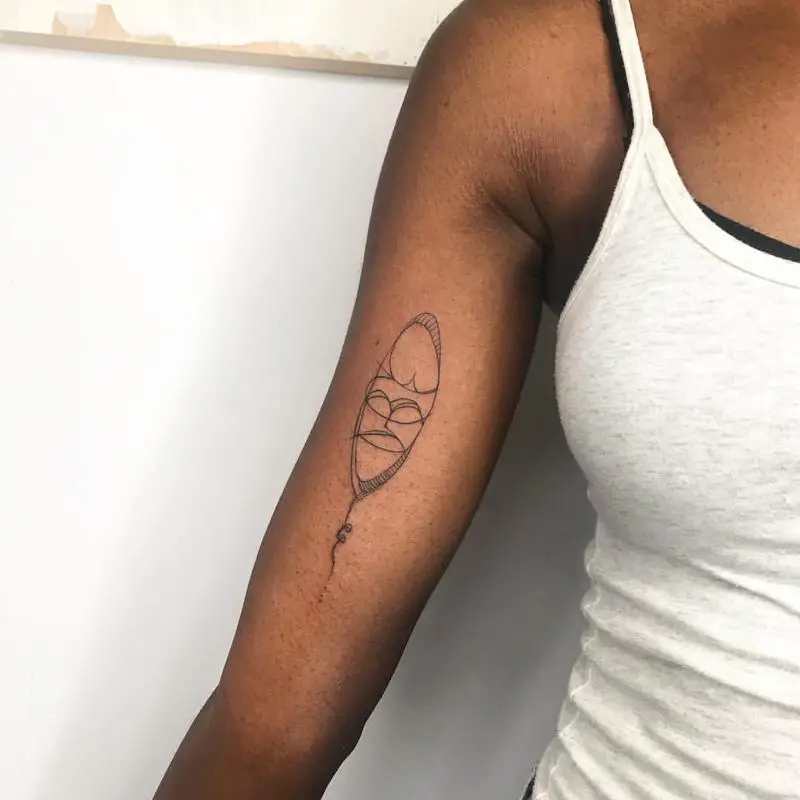
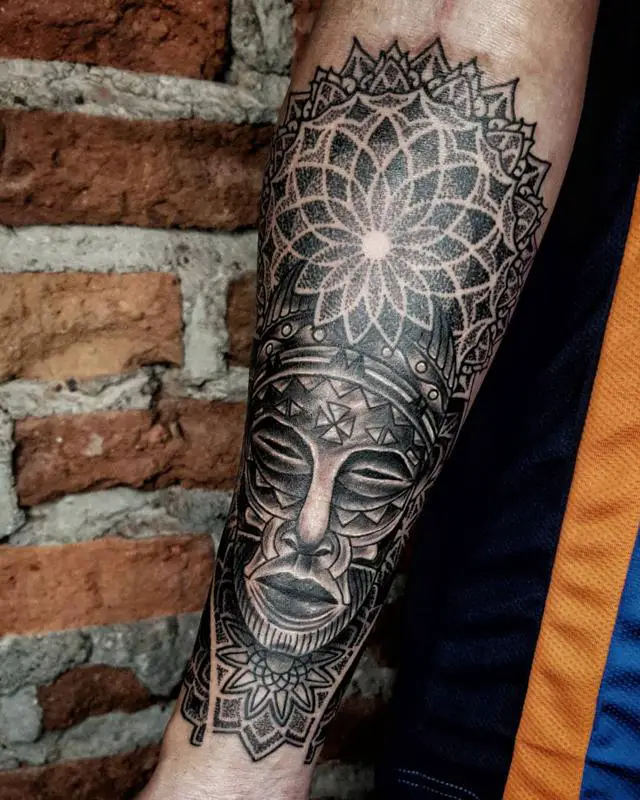

One of the most essential features of African cultures and traditions is the mask. African masks carry deep meaning and symbolize a form of transformation or acquiring a new entity. Because of the masks, African people believed they can influence spirits or appeal to them.
Masks are also essential during religious or dance rituals, as well as ceremonies. These masks look incredible, and the artistic creativity of the makers is beyond this world. So, what better design to go for than an African mask for those who want an Afrocentric tattoo.
African Continent Tattoo
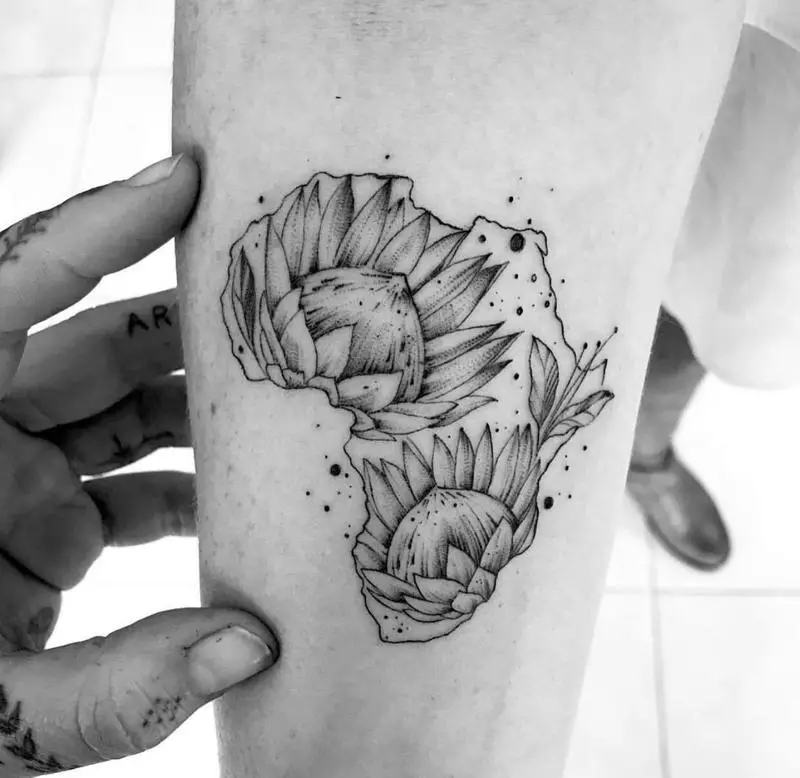

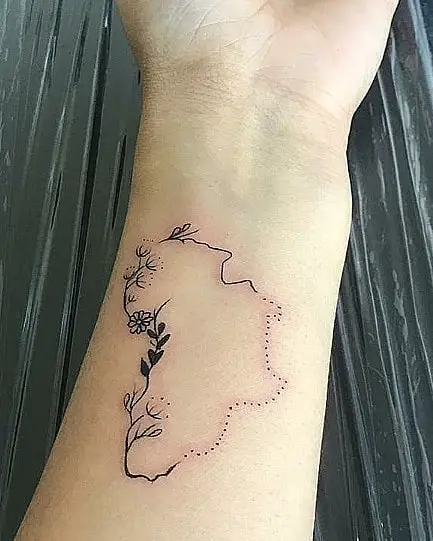
Now, this is one of the most common design choices for people who want to honor and reconnect with their African roots. A lot of African people, from different countries, live abroad. Also, historically, many of the families were disconnected from their African roots thanks to slavery. So, people nowadays feel the need to reconnect with their roots, and they find that tattoo designs depicting the African continent work the best.
South African Flag Tattoo
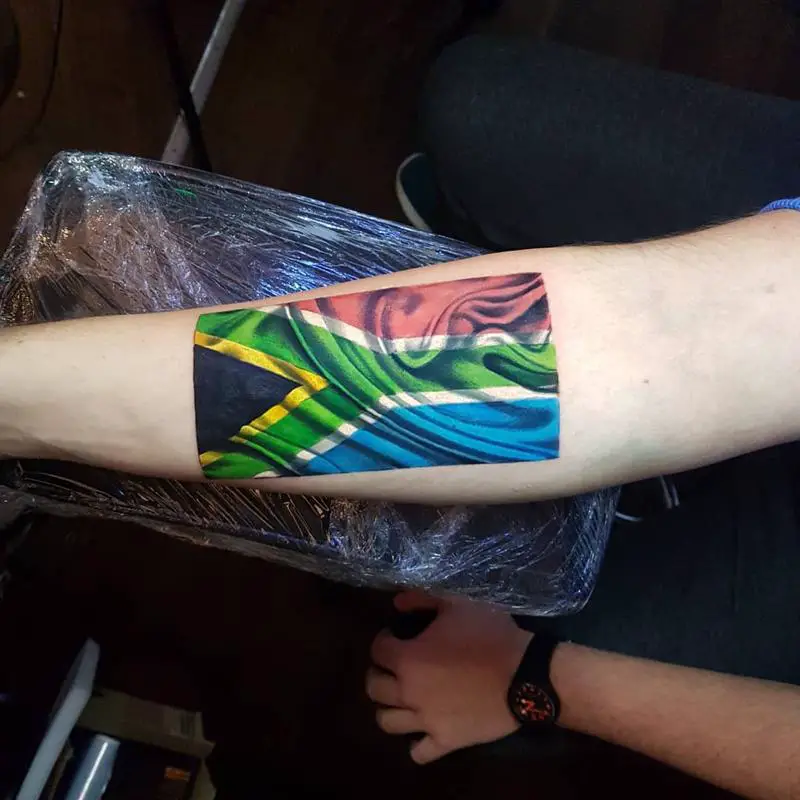
South Africa or a country in the southernmost part of the African continent. It is one of the most beautiful countries in the world, and a country with one of the most riveting histories. Because of its beauty and diversity, many visit this country.
However, a lot of South Africans are leaving it due to political issues and issues with segregation and apartheid. But, to honor their roots and the love of their country, a lot of people get the South African flag tattoo. This kind of tattoo can be done with any other African country flag.
African Landscape/Nature Tattoo
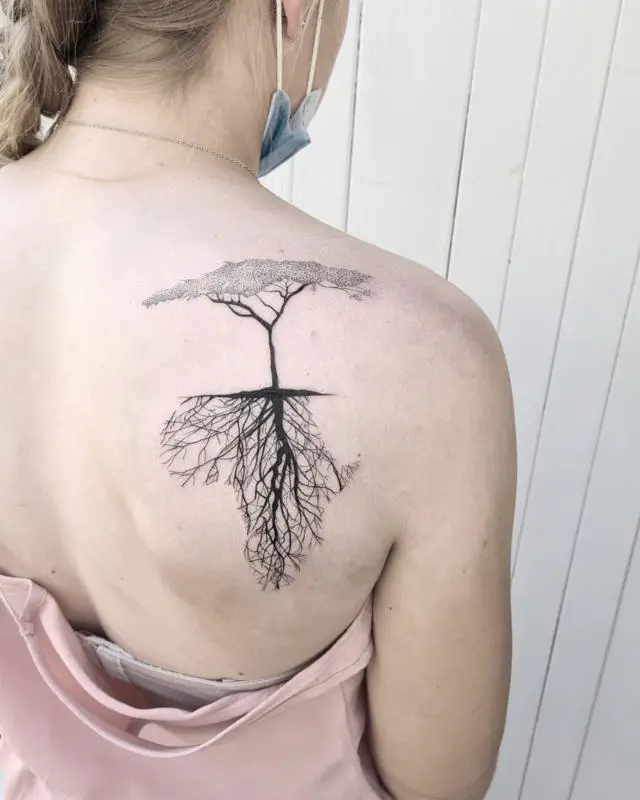
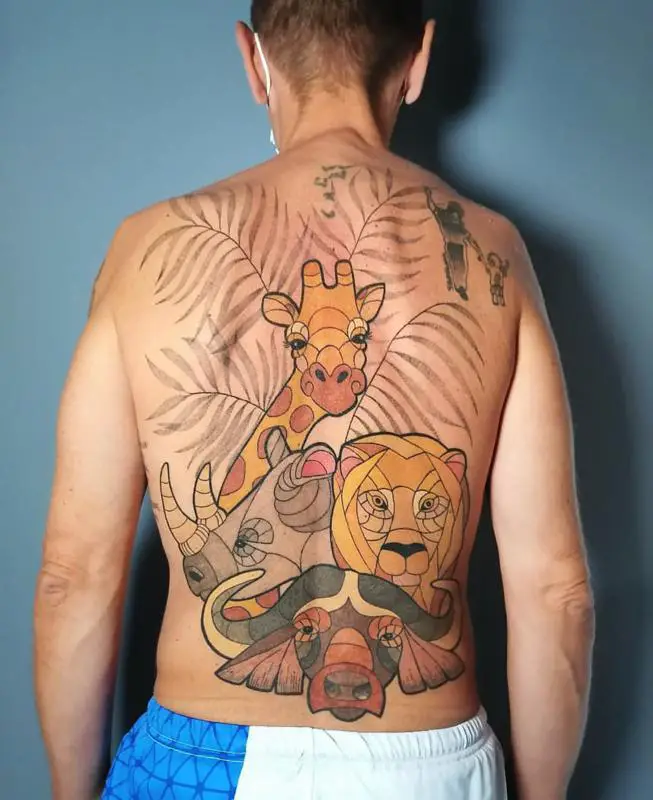
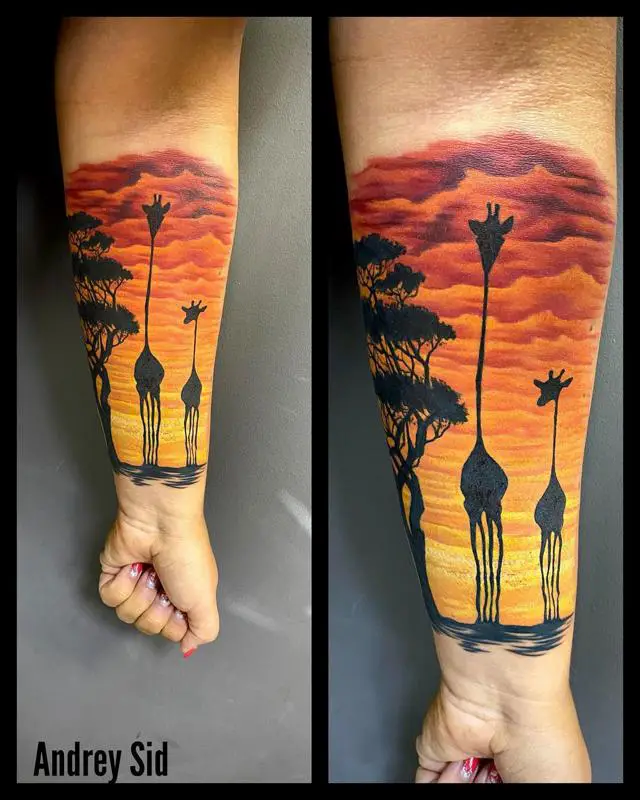
Another wonderful way to pay homage to one’s roots is to get a tattoo depicting the incredible and breathtaking African landscape. Most commonly, such tattoos depict the typical African nature, like the Acacia tree, the incredible sunset, colors like yellow, red, and green, African animals, etc. These tattoos look best when done in watercolor tattoo style; the colors just come to life and resemble African nature to the fullest.
Final Thoughts
We hope this article was insightful when it comes to African tattooing history, culture, and tradition. We tried to stay as informative and as concise as possible. However, we do have to emphasize that by getting African tattoos without actually having an African origin or ancestry, you might be committing cultural appropriation.
Surely enough, African people aren’t offended by that, but just to remain respectful to these peoples’ countries, traditions, origins, and cultures, one should avoid getting an Afrocentric tattoo if one has no connection or origin history.
The post African Tattoos: Tattooing Tradition, Designs, and Meanings appeared first on Saved Tattoo.
[ad_2]
